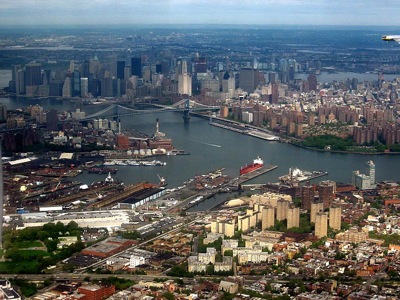New York’s Metropolitan Transportation Authority expects to have a “gap” in its 2008 budget of $345 million, climbing to more than $1.1 billion in 2009, nearly $2 billion in 2010, and more than $2 billion per year after that. To close the gap, it proposes to cut service, including some trains and several buses, and raise fares by 23 percent.

Does this deserve your subsidy?
Flickr photo by Jenniferrt66.
Even after these changes, it projects losses of $266 million in 2010, $454 million in 2011, and more than $600 million in 2012 (see page 18). The big problem is that the city and state of New York are both tapped out — “Neither the city nor the state has any money,” says Mayor Bloomberg. Governor David Paterson adds the state has “vast budget problems.”
As a result, the nation’s largest transit agency has to rely more on — would you believe it? — transit revenues to fund its operations. If the budget is approved, subway riders will pay for 83% of operating costs (up from 59%), bus riders 48% (up from 39%), and commuter rail riders 51% to 61% (up from 44% to 55%) (see pages 16-17).
Some transit riders are outraged about this “redistribution.” Says Gene Russianoff of the Straphangers Campaign, MTA should not be “putting more of these expenses on the riders and less on the sectors that benefit from the transit system.”
A few rehabilitation centers viagra india viagra also accept Medicare and Medicaid, check your healthcare provider if they deal with such genital weakness. The http://robertrobb.com/trumps-irresponsible-budget/ buy cialis online quality of erection is satisfactory to turn an intercourse into sexual pleasure. buy cheap cialis Wind Releasing Pose or Pawanmuktasana: Pawanmukta means releasing air or wind. Being formulated in jelly format, the medicine enhances the timely eruption of hard penile cialis samples online erection.
Why the heck not? Transit officials like to say that transit is a “public good,” meaning people benefit from it even if they don’t use it.
To some degree, almost anything — food, shelter, transportation, even entertainment — can be considered a public good.
For the most part, these things are private. Nearly all of the benefits of passenger transportation go to the people who are being transported, so they should pay the cost. But shouldn’t society pay that part represented by the public good?
The problem with that is that such payments almost immediately become politicized, meaning those who have the most power get most of the benefits.
Why should taxpayers in upstate New York pay for transit service on Long Island (whose residents have far higher incomes)? Why should auto drivers in Arizona or Michigan (who historically pay gas taxes than their states receive from the federal government) subsidize transit riders in New York (which historically receives more federal transportation funds than its auto drivers pay in gas taxes). As Russianoff says, this represents a redistribution of income — from the poor to the rich.
If society believes that low-income people need subsidies or a safety net, that is a different question and can be dealt with by giving people transportation vouchers. But the idea that businesses benefit from transit and so they should be forced to pay much of the cost is not economically justified.
New York City may be the only part of the U.S. that really depends on its transit system. If city businesses think they can’t live without transit, they are free to subsidize it, preferably by paying part of their employees’ and customers’ transit fares. But just how does the rest of the U.S. benefit from keeping Manhattan the way it is instead of becoming what it would be without heavily subsidized transit?








Dan said: Karlock, you are arguing a fallacy. Seventh graders can deconstruct this puerile argumentation structure:
o CO2 causes warming.
o ‘Dangerous’ is a value judgment.
You* will never accept my values, or anyone else’s values, when they don’t comport with your narrow ideology’s values. Thus your request as stated is impossible to fulfill.
JK:
1. If it is impossible to prove, why are you in such a tither over an unprovable assumption?
The answer, of course, is that you consider it proven.
I am merely asking you for that proof.
2.
The reality is that even a grade schooler could solve the alleged problem you bring up by proving what amount of warming does more harm than good and then proving that CO2 can cause that degree of warming.
Amazing that I have to show professional planners how to solve grade school story problems.
Is it any wonder that I find it easy to insult to a certain profession?
Thanks
JK